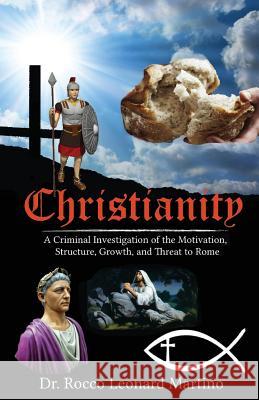Christianity: A Criminal Investigation of the Motivation, Structure, Growth, and Threat to Rome » książka
Christianity: A Criminal Investigation of the Motivation, Structure, Growth, and Threat to Rome
ISBN-13: 9780983564980 / Angielski / Miękka / 2015 / 258 str.
Christianity: A Criminal Investigation of the Motivation, Structure, Growth, and Threat to Rome
ISBN-13: 9780983564980 / Angielski / Miękka / 2015 / 258 str.
(netto: 57,61 VAT: 5%)
Najniższa cena z 30 dni: 60,00
ok. 16-18 dni roboczych
Bez gwarancji dostawy przed świętami
Darmowa dostawa!
Christianity: A Criminal Investigation of the Motivation, Structure, Growth and Threat to Rome is centered in Rome, during the reign of the Emperor Vespasian who ruled from 69 to 79 AD. The setting for this book is early in his reign. At that time, Rome was riddled with cross currents and struggles for power. Vespasian was the fourth emperor in a year. The other three were either murdered or forced into suicide. Vespasian, the general in command in suppressing the revolt of the Jews in Judea, seized power backed by the might of his Germanic Legions. His son Titus destroyed Jerusalem, and the Temple, to end the revolt in Judea. Emperor Vespasian then named his son Titus to head the Praetorian Guard, cementing his hold on power in Rome. He ruled wisely, and was popular with the people. Early in his reign, the question of the Christians came to his attention. This book depicts that controversy. There were many who favored a continuation of the persecution initiated by the Emperor Nero. This persecution, terrible, cruel, brutal, and extensive in its impact, also saw the execution of both Peter and Paul. Many favored a continuation of this persecution; while some favored allowing the Christians to live in peace. There was even a glimmer of the idea of union that led three hundred years later for Rome to establish Christianity as its official religion. The approach taken in this book is to remain as true as possible to what is known and cataloged in the Scriptures and other extant historical texts. Extensive use has been made of the Epistles of Peter and Paul, with numerous quotations included in the text. These quotations are taken from the New International Version of the Bible, accessed through BibleGateway.com. The objective was to illustrate the direction given to the early church by these two great leaders, Peter and Paul. Both were driven by their firsthand knowledge of the teachings of Jesus. Both were martyred for their faith. The central character, or hero, of this story is Quintus Gaius Caesar, now a Senator, and previously a Tribune and Deputy Prefect of the Praetorian Guard. It was Quintus whom the Emperor Tiberius placed in charge of the Investigation into the disappearance of the body of Jesus from the tomb. It was Quintus' investigation and report to Tiberius that is the basic story in the earlier book The Resurrection: A Criminal Investigation... In this book, Quintus is commanded by Vespasian to recommend one of three possible solutions for the problem of the Christians. They were to be exiled, they were to be executed, or they were to be allowed to live in peace. Quintus, with the help of members of the Praetorian Guard, and knowledgeable witnesses such as the physician Luke, and the Tribune Cornelius (formerly a Centurion), sets in motion a wide-ranging investigation of Christianity. Is it a religion, is it a threat to Rome, can it survive, and what is attracting vast numbers to join? Quintus sets out to establish the answers to these questions. His investigation includes a detailed study of the Epistles of Paul and Peter, and long interview with Cornelius, the first Gentile baptized in the new religion; extensive and direct interaction with the physician Luke, companion and chronicler of the activities of Peter and Paul; an assessment of the lives and work of Peter and of Paul; and extensive interviews with Cornelius, with Linus the successor of Peter; and with Cletus and Clementus, the potential successors of Linus. A fictional opponent to the Christians, Senator Sarto, was invented to give poignancy and suspense to the story. He was representative of the many who sought to continue the persecution of the Christians.











